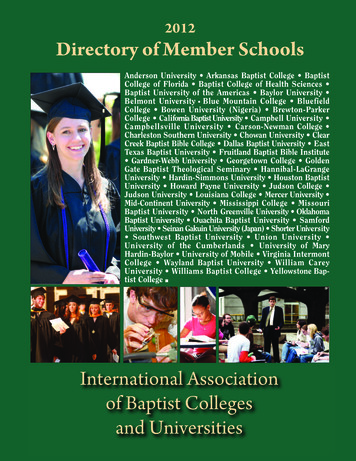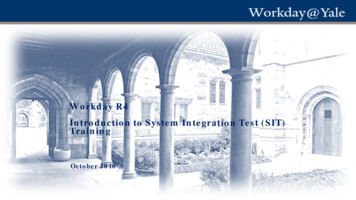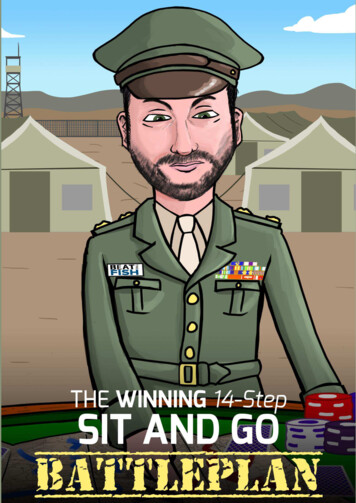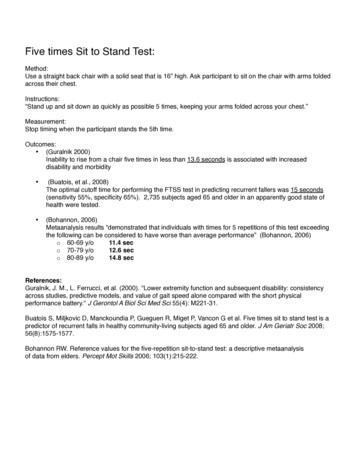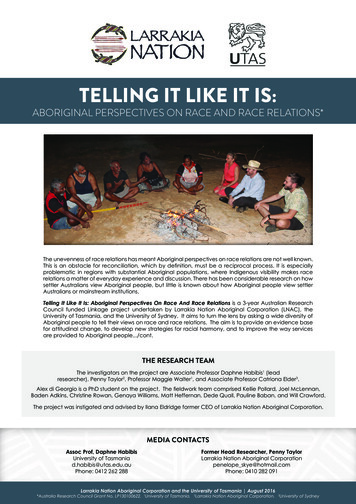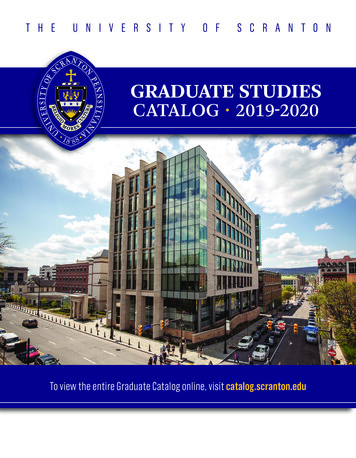
Transcription
T H EU N I V E R S I T YO FS C R A N T O NGRADUATE STUDIESCATALOG 2019-2020To view the entire Graduate Catalog online, visit catalog.scranton.edu
A Community of ScholarsA Culture of ExcellenceAugust 2019Graduate CatalogThe University of Scranton800 Linden StreetScranton, Pennsylvania 18510-4632www.scranton.eduOur Mission: The University of Scranton is a Catholic and Jesuit university animated by the spiritual visionand the tradition of excellence characteristic of the Society of Jesus and those who share its way ofproceeding. The University is a community dedicated to the freedom of inquiry and personal developmentfundamental to the growth in wisdom and integrity of all who share its life.Our Vision: The University of Scranton will be boldly driven by a shared commitment to excellence. Wewill provide a superior, transformational learning experience, preparing students who, in the words of Jesuitfounder St. Ignatius Loyola, will "set the world on fire."Our Institutional Student Learning Outcomes: Graduates of The University of Scranton will move beyondthe possession of the intellectual and practical skills that form the basis of professional competence andinspired by The Magis possess the knowledge and ability to address the most significant questions,engaging their colleagues successfully and ethically, and advancing towards positions of leadership in theirchosen field of study. Furthermore, our graduates will, through their experience of cura personalis,demonstrate that they are persons of character and women and men for and with others, through theirdevotion to the spiritual and corporal welfare of other human beings and by their special commitment to thepursuit of social justice and the common good of the entire human community.Upon completion of their program of study, students will be able to:Develop and use the intellectual and practical competencies that are the foundation of personal andprofessional development and lifelong learning including oral and written communication, scientific andquantitative reasoning, critical analysis and reasoning, and technological competency and informationliteracy.Exhibit broad knowledge of the human condition, understanding the world in its physical and naturalaspects, as well as the philosophical and theological basis for modern thought, faith and belief.Demonstrate competence in their chosen field of study, using the knowledge and ability to address the mostsignificant questions, and advancing towards positions of leadership.Employ their knowledge and intellect to address situations in a way that demonstrates a devotion to thespiritual and corporal welfare of other human beings and by a special commitment to the pursuit of socialjustice and the common good of the entire human community.Corporate Title: The University of Scranton
Table of ContentsAccreditations and Licensures . 4Mission Statement/Memberships of the University . 5Academic Calendar . 9MBA Online Modules: Four week sessions .12Application for Degree .13General Information .14Graduate Programs .15Mission and Objectives .16Admission and Registration.17Academic Regulations .25Resources.47Tuition and Fees .58Fees.59Schedule of Refunds .60Accountancy .61Business Administration .68Chemistry, Biochemistry, Clinical Chemistry .83Clinical Mental Health Counseling, Rehabilitation Counseling, School Counseling .88Education .106Finance .117The Program of Study .117Health Administration and Human Resources .120Human Resources Management, MS .129Health Informatics .133Nursing .135Nurse Anesthesia, DNP .149Occupational Therapy .152Physical Therapy .154Software Engineering .161Theology .164World Languages and Cultures .167Course Descriptions.168University Administration .247
Accreditations and LicensuresThe University of Scranton is accredited by The Middle States Commission on Higher Education(MSCHE), 3624 Market Street, Philadelphia, PA 19104. In addition to this institutional accreditation, manygraduate programs hold disciplinary accreditations. These are listed below. The Graduate Program areasand associated accreditations are:Doctor of Physical Therapy degreeCommission on Accreditation in Physical Therapy Education/CAPTEMaster of Science degree in EducationPennsylvania Department of Education (PDE)Master of Health Administration degreeCommission on Accreditation of Healthcare Management Education (CAHME)Master of Science degree in Clinical Mental Health CounselingCouncil for Accreditation of Counseling and Related Educational Programs (CACREP)Master of Science degree in School CounselingCouncil for Accreditation of Counseling and Related Educational Programs (CACREP)Pennsylvania Department of Education (PDE)Master of Science degree in Rehabilitation CounselingCouncil on Rehabilitation Education (CACREP)Master of Business Administration degreeThe Association to Advance Collegiate Schools of Business (AACSB)Master of Science in Nursing degreeCommission on Collegiate Nursing Education (CCNE)Council on Accreditation of Nurse Anesthesia Educational Programs (COA)Pennsylvania State Board of NursingMaster of Science degree in Occupational TherapyAccreditation Council for Occupational Therapy Education (ACOTE)
Rights ReservedThe President and officers of The University of Scranton reserve the right to change the information,regulations, requirements and procedures announced in this catalog; to change the requirements foradmission, graduation or degrees; to change the arrangement, scheduling, credit, or content of courses; andto change the fees listed in this catalog.The University reserves the right to refuse to admit or readmit any student at any time should it be deemednecessary in the interest of the student or of the University to do so and to require the withdrawal of anystudent at any time who fails to give satisfactory evidence of academic ability, earnestness of purpose, oractive cooperation in all requirements for acceptable scholarship.Mission Statement/Memberships of the UniversityHistorical Prologue:A comprehensive, co-educational institution, The University of Scranton is by tradition, choice andheartfelt commitment, a Catholic and Jesuit university. Founded in 1888 as Saint Thomas College by theMost Reverend William G. O'Hara, D.D., the first bishop of Scranton, it achieved university status in 1938,and was entrusted to the care of the Society of Jesus (the Jesuits) in 1942.The Mission of the University:The University of Scranton is a Catholic and Jesuit university animated by the spiritual vision and thetradition of excellence characteristic of the Society of Jesus and those who share in its way of proceeding.The University is a community dedicated to the freedom of inquiry and personal development fundamentalto the growth in wisdom and integrity of all who share in its life.The Characteristics and Goals of the University:As a Catholic and Jesuit University, The University of Scranton1.2.3.Shares with all, the fullness of the Catholic intellectual tradition, the distinctive worldview of theChristian Gospels, and the Spirituality of St. Ignatius Loyola.Educates men and women for others who are committed to the service of faith and promotion ofjustice.Invites persons from other religious traditions and diverse backgrounds to share in our work andcontribute to our mission.4.As a Comprehensive University, The University of Scranton4.5.Offers degree programs at the undergraduate and graduate levels in the traditional disciplines ofthe liberal arts as well as in pre-professional and professional areas.Provides educational opportunities and support programs that promote the mission of theUniversity, meet the needs and interests of traditional and non-traditional students, and serve theneeds of the local region.
As a University in the Liberal Arts Tradition, The University of Scranton6.7.8.9.Offers undergraduate students a core curriculum in the Jesuit tradition based on the arts andsciences.Imparts to students the importance of gathering, evaluating, disseminating, and applyinginformation using traditional and contemporary methods.Provides learning experiences that reach beyond the fundamental acquisition of knowledge toinclude understanding interactions and syntheses through discussion, critical thinking, andapplication.Promotes a respect for knowledge and a lifelong commitment to learning, discernment and ethicaldecision making.As a Caring Community, The University of Scranton10. Fosters a spirit of caring, grounded in the Jesuit tradition of cura personalis, which enables allmembers of our community to engage fully in our mission, according to their needs and interests.11. Facilitates the personal growth and transformation of all members of University communitythrough a spirit of caring.12. Extends this spirit of caring to the wider community through civic engagement and service.13. Enhances our sense of community by demonstrating high standards and care for our physicalenvironment.As a Dynamic Institution, The University of Scranton14. Develops goals and aspirations by systemically reflecting on opportunities for and challenges tofulfilling our mission.15. Fulfills our mission through careful planning and management of resources in order to achieve ouraspirations while remaining affordable to our students.16. Engages the University community in purposefully monitoring progress toward theaccomplishment of our mission.
Memberships of the UniversityAcademy of Criminal JusticeAmerican Association for Higher Education (AAHE)American Association of Hispanics in Higher Education, Inc. (AAHHE)American Association of Colleges for Teacher Education (AACTE)American Association of Colleges of Nursing (AACN)American Association of Nurse Practitioners (AANP)American Association of University Women (AAUW)American College of Healthcare Executives (ACHE)American College and Research Libraries (ACRL)American Council on Education (ACE)American Library Association (ALA)American-Mideast Education & Training Services, Inc. (AMIDEAST)American Occupational Therapy Association (AOTA)American Physical Therapy Association (APTA)ASIA NetworkAssociated New American Colleges (ANAC)Association for Continuing Higher Education, Inc. (ACHE)Association for the Advancement of Sustainability in Higher Education (AASHE)Association to Advance Collegiate Schools of Business (AACSB International)Association of American Colleges and Universities (AACU)Association of Catholic Colleges and Universities (ACCU)Association of Governing Boards of Universities and Colleges (AGB)Association of Independent Colleges & Universities of Pennsylvania (AICUP)Association of International EducatorsAssociation of Integrative Studies (AIS)Association of Jesuit Colleges and Universities (AJCU)Association of University Programs in Health Administration (AUPHA)Center for Academic Integrity (CAI)Chamber of Commerce Greater ScrantonCollege BoardCommission for Independent Colleges and Universities (CICU)Commission on Accreditation of Healthcare Management Education (CAHME)Commission on Accreditation in Physical Therapy Education (CAPTE)Commission on Collegiate Nursing Education (CCNE)Commission on Accreditation for Exercise Science(COAES)Council on Higher Education Accreditation (CHEA)Council of Graduate Schools (CGS)Council on Accreditation of Nurse Anesthesia Education Programs (COA)Council of Independent Colleges (CIC)Council on Undergraduate Research (CUR)Council for Standards in Human Service Education (CSHSE)Free Clinic PAFulbright AssociationFuld Institute for Technology in Nursing EducationHispanic Association of Colleges and Universities (HACU)Higher Education Data Sharing Consortium (HEDS)Institute of International Education (IIE)Jesuit Conference of Nursing Program (JCNP)Lackawanna Interagency Council (Lackawanna IAC)Lilly Fellows Program in Humanities and the ArtsLyrasisMiddle States Commission on Higher Education (MSCHE)
National Association for Free and Charitable Clinics (NAFCC)National Association for Women in Catholic Higher Education (NAWCHE)National Association of Graduate Admissions Professionals (NAGAP)National Council on Rehabilitation Education (NCRE)National Forum for Latino Health Care Executives (NFLHE)National League for Nursing (NLN)National Organization of Nurse Practitioner Faculties (NONPF)National Strength and Conditioning Association (NSCA)National Student Nurses Association (NSNA)Northeast & Central Pennsylvania Interprofessional Education Coalition (NECPA IPEC)New American Colleges & Universities (NAC & U)Northeast Pennsylvania Library Network (NPLN)Northeastern Association of Graduate SchoolsNortheastern Pennsylvania Diversity Education Consortium (NEPDEC)Nursing Education Consortium of NEPAOCLCPennsylvania Academic Library Consortium, Inc.Pennsylvania Association of Colleges and Teacher Educators (PACTE)Pennsylvania Association of Colleges and Universities (PACU)Pennsylvania Association of Graduate SchoolsPennsylvania Higher Education Nursing School Association (PHENSA)Pennsylvania Library Association (PaLA)SAP University AllianceScholarly Publishing & Academic Resources Coalition (SPARC)Society for College and University Planning (SCUP)Society for Human Resource Management (SHRM)University Continuing and Professional Education Association (UCPEA)Westchester Academic Library Directors Organization (WALDO)
Academic CalendarOn-Campus ProgramsFL 2019INT FT 2020INT M1SP 20202020201910201920201920201930Orientation for Graduate Students22-Aug23-JanClasses start26-AugLabor Day Holiday, no classes2-SeptLast Day to drop/no grade with refund*25-SeptLast Day to register Comprehensive Exams27-Sept28-FebFall/Spring Easter break eb24, 25 and 31-Dec;Winter Holidays1-Jan;20-Jan20-JanClasses resume after Fall/Spring break15-Oct23-MarGraduate Comprehensive Exams19-Oct28-MarLast day to withdraw/ "W" Grade8-NovThanksgiving Holiday begins27-NovClasses Resume after Holiday2-DecLast Day for theses, scholarly papers8-NovFinal Examinations10-Dec28-Jan28-Jan18-MayLast day of term14-Dec28-Jan28-Jan15-MayDegree conferral/Graduate Commencement31-Dec31-Jan31-Jan30-MayMemorial Day Holiday21-Jan21-Jan17-Apr17-Apr25-May
Summer 2020Session Classes 9-Jul29-May19-JunLast day to drop/no grade with refund* 24-JunHoliday, No class3-5 JulLast day to withdraw /"W" Grade31-JulLast day to register ComprehensiveExams19-JunGraduate Comprehensive Exams11-JulLast day for theses, scholarly papers31-JulFinal Exams, if any3-5 7-AugSession Ends28-Aug26-Jun31-Jul7-Aug7-AugFinal Grades Due by 3:00pm31-Aug29-Jun10-Aug10-Aug10-AugDegree conferral31-Aug31-Aug31-Aug31-Aug31-Aug* See refund schedule
Calendars for Online Graduate ProgramsOnline Programs: Accountancy, Business Administration, Finance, Health Administration, HealthInformatics, Human Resources Management, Educational Administration, and Curriculum & InstructionOnline Eight Week SessionsCommon Dates for Special 2019-2020 TermsApplications for Degree Deadlines:Fall and IntersessionNov 16, 2018MayJan 30, 2019AugustJuly 7, 2019Click here to Apply for degreeDegree Conferral ENT25-MaySummer31-AugOnline Special Fall 2019 - 201915Part of Term2A2BCLASSES START26-Aug21-OctLast day to drop/no grade with refund*11-Sept6-NovLast day to withdraw/"W" grade8-Oct3-DecLast day of term20-Oct15-DecPart of Term2A2BCLASSES START13-Jan9-MarLast day to drop/no grade with refund*29-Jan25-MarOnline Special Spring 2020 - 201935
Last day to withdraw/"W" grade25-Feb21-AprLast day of term8-Mar3-MayPart of Term2A2BCLASSES START4-May29-JunLast day to drop/no grade with refund*20-May15-JulLast day to withdraw/"W" grade16-Jun11-AugLast day of term28-Jun23-AugPart of Term4A4B4C4DCLASSES START26-Aug2-Sept21-Oct18-NovLast day to drop/ no grade with refund*29-Aug26-Sept24-Oct21-NovLast day to withdraw/"W" grade15-Sept13-Oct10-Nov8-DecLast day for term22-Sept20-Oct17-Nov15-DecPart of Term4A4B4C4DCLASSES START13-Jan10-Feb9-Mar6-AprLast day to drop/no grade with refund*16-Jan13-Feb12-Mar9-AprLast day to withdraw/"W" grade2-Feb1-Mar29-Mar26-AprLast day of term9-Feb8-Mar5-Apr3-MayOnline Special Summer 2020 - 201945MBA Online Modules: Four week sessionsSpecial Fall 2019-201915Online Special Spring 2020 - 201935
Online Special Summer 2020 - 201945Part of Term4A4B4C4DCLASSES START4-May1-Jun29-Jun27-JulLast day to drop/no grade with refund*7-May4-Jun2-Jul30-JulLast day to withdraw/"W" grade24-May21-Jun19-Jul16-AugLast day of term31-May28-Jun26-Jul23-Aug* See refund scheduleApplication for DegreeStudents expecting to complete degree requirements for a spring graduation must make formal applicationonline through their Self-Service account in the University portal, my.scranton.edu by January 31st.Students who are expecting to complete degree requirements for an August graduation date must applyby June 30th; students who are expecting to complete degree requirements for a December or Januarygraduation date must apply by October 31st. More information can be found on the Commencementwebpage at www.scranton.edu/commencement.
General InformationAs a Catholic and Jesuit institution of approximately 3,800 undergraduates and nearly 1,600 graduatestudents in Pennsylvania's Pocono Northeast, The University of Scranton – founded in 1888 – delivers ameaningful education that challenges its students morally, spiritually and intellectually.Scranton has flourished under the Jesuits and today is among the top tier of nationally ranked universities.For 25 consecutive years, U.S. News & World Report's "America's Best Colleges" edition has ranked theUniversity among the 10 top master's universities in the North and was also recognized for "StrongCommitment to Undergraduate Teaching" as well as one of the "Most Innovative Schools.""Best Colleges," "Best Buys in College Education," "America's Best Colleges," "Best Value," – these arejust a few of the ways that the nation's leading college rankings and guidebooks consistently refer to TheUniversity of Scranton. The rankings of our graduate programs are as follows: Rehabilitation Counseling#32; Healthcare Management #46; Physical Therapy #53; Occupational Therapy #58; Nurse Anesthesia#65; Online MBA #109; and Nursing #109. U.S. News also ranked Scranton at No. 52 in the country for"Best Online MBA Programs for Veterans."For the past 17 years, The Princeton Review has included Scranton among its "Best Colleges" in the nation.Washington Monthly ranked Scranton #107 among master's universities in the nation for our graduates'contribution to "social mobility, research and service." U.S. News consistently ranks Scranton on its "bestvalue" lists. The Wall Street Journal and Times Higher Education ranked Scranton as a "Top U.S. College"based on value and outcomes.Scranton is among just 361 colleges in the nation earning the highly selective 2015 CommunityEngagement Classification designated by the Carnegie Foundation for the Advancement of Teaching. TheUniversity has also been listed among the 198 colleges in the nation included in the 11th edition of Barron's"Best Buys in College Education."For 14 consecutive years, the University's Kania School of Management has been included among thePrinceton Review's "Best 252 Business Schools." GI Jobs has listed Scranton among the top 15 percent ofcolleges, universities and trade schools in the nation as a Military Friendly School. For 11 consecutiveyears, Scranton has ranked among the nation's elite universities included in Forbes magazine's online listingof "America's Top Colleges." The University ranked as the 26th "Healthiest" colleges in the U.S.,according to a September 2016 listing posted on Greatist.com, an online source for health and fitnessinformation.In a July 2011 article titled "The Friendliest Colleges," published by The Huffington Post, Scranton wasranked among the eight most pleasant colleges in the country. The University was named to the President'sHigher Education Community Service Honor Roll for 2014, the highest federal recognition colleges anduniversities can receive for its commitment to volunteering, service learning and civic engagement. Just766 colleges in the nation were named to the 2014 President's Community Service Honor Roll.In recognition of its work as a values-centered institution, the University is one of 100 American schoolsnamed to the John Templeton Foundation's Honor Roll of Colleges That Encourage CharacterDevelopment.
Graduate ProgramsGraduate study was initiated at The University of Scranton in 1950, the first master's degrees beingawarded in 1952. At present, the following graduate programs are offered:AccountancyMAccAdult-Gerontology NursingMSNBiochemistryMSBusiness AdministrationMBA, DBABusiness Administration/Health Administration(Dual Program)MBA/MHAChemistryMSClinical ChemistryMSClinical Mental Health CounselingMSCurriculum and InstructionMSEarly and Primary Teacher EducationMSEducational AdministrationMSFinanceMSFamily Nurse PractitionerMSNHealth AdministrationMHAHealth InformaticsMSHuman Resources ManagementMSNurse AnesthesiaMSNNursing PracticeDNPOccupational TherapyMSPhysical TherapyDPTReading EducationMS, MARehabilitation CounselingMSSchool CounselingMSSecondary EducationMS
Software EngineeringMSSpecial EducationMSTheologyMAEducation Certification ProgramsThe University has certification programs approved by the Pennsylvania Department of Education in theareas listed below. Some of these may be pursued in connection with an undergraduate degree, some inconnection with a graduate degree, and some may be pursued independent of any degree program.Secondary Education/General ScienceSupervisor Certificates* in:Communication (English)School Guidance Services, PK-12Foreign LanguagesScienceMathematicsSocial StudiesReading*Not currently accepting studentsMission and ObjectivesAs one of the family of worldwide Jesuit Colleges and Universities, The University of Scranton shares withthem a common educational heritage and tradition. Its principal objective, therefore, is to lead the student tounderstand and to inspire him/her to fulfill that complex of dignities and responsibilities which man orwoman, as a person and as a member of human society, is under God.Communication of Information: Statement on the Expected use of theUniversity of Scranton E-mail AccountWhen students are admitted to The University of Scranton, a University e-mail account is created for them.All electronic communication from the University is directed exclusively to the University's electronicmailbox. Students are expected to access their University e-mail account on a weekly basis; however, dailyaccess is recommended to stay abreast of important, time-sensitive information. University departmentsand faculty routinely will use email to communicate important campus, academic program and courseinformation.Information on how to access the network and e-mail is regularly distributed to new students by theInformation Resources Department. For more information on how to access your University of Scranton email account, visit the Information Resources Website at https://www.scranton.edu/pir/policies.shtml. Ifyou encounter problems accessing your e-mail, contact the Technology Support Center at (570) 941-4357.
Policy on Students with DisabilitiesThe University of Scranton complies with all applicable laws and regulations with respect to the provisionof reasonable accommodation for students with disabilities as these terms are defined in the law. TheUniversity will provide reasonable accommodations so that students can fully participate in curricular andextracurricular activities. Students who have a physical or learning disability and need assistance to achievesuccessfully their academic or extracurricular goals should contact the Center for Teaching and LearningExcellence at (570) 941-4038.Non-Discrimination StatementThe University of Scranton is committed to providing a safe and nondiscriminatory employment andeducational environment. The University does not discriminate on the basis of race, color, national origin,sex, disability, religion, age, veteran status, gender identity or expression, sexual orientation, or other statusprotected by law. Sexual harassment, including sexual violence, is a form of sex discrimination prohibitedby Title IX of the Education Amendments of 1972. The University does not discriminate on the basis of sexin its educational, extracurricular, athletic, or other programs or in the context of employment. Inquiriesregarding the nondiscrimination and sexual harassment and sexual misconduct policies may be directed toElizabeth M. Garcia, Title IX Coordinator and Executive Director of the Office of Equity and Diversity570-941-6645.It is the personal responsibility of each student to acquire an active knowledge of all pertinent regulationsset forth in the Graduate Catalog.Within the various schools and colleges the only official interpretations or modifications of academicregulations are those which are made in writing by the dean of the school or college of which the student isa member, or such interpretations or modifications of academic regulations, as are approved by theappropriate dean in writing.Admission and RegistrationApplication ProcessStudents must be formally admitted to The University of Scranton, in order to register for any graduatecourses.On-Campus ProgramsThe Application for Admission is submitted by visiting the Admission's link, www.scranton.edu/gradapply.Completed applications, together with official transcripts of undergraduate and graduate work takenelsewhere, letters of recommendation, any required test scores, and other supporting documents, should bereceived in the Office of Graduate Admissions at least one month before the term in which the studentwishes to begin graduate study. Some graduate programs may have specific application deadlines.International students should apply and have all materials
The University of Scranton 800 Linden Street Scranton, Pennsylvania 18510-4632 www.scranton.edu Our Mission: The University of Scranton is a Catholic and Jesuit university animated by the spiritual vision . MBA Online Modules: Four week sessions .





